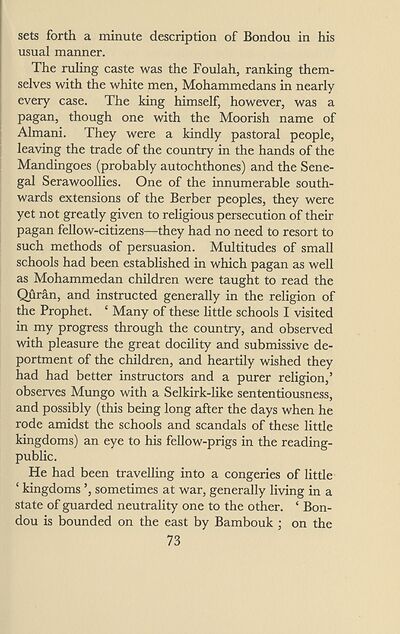Niger
(79)
Download files
Complete book:
Individual page:
Thumbnail gallery: Grid view | List view

sets forth a minute description of Bondou in his
usual manner.
The ruling caste was the Foulah, ranking them¬
selves with the white men, Mohammedans in nearly
every case. The king himself, however, was a
pagan, though one with the Moorish name of
Almani. They were a kindly pastoral people,
leaving the trade of the country in the hands of the
Mandingoes (probably autochthones) and the Sene¬
gal Serawoollies. One of the innumerable south¬
wards extensions of the Berber peoples, they were
yet not greatly given to religious persecution of their
pagan fellow-citizens—they had no need to resort to
such methods of persuasion. Multitudes of small
schools had been established in which pagan as well
as Mohammedan children were taught to read the
Quran, and instructed generally in the religion of
the Prophet. c Many of these little schools I visited
in my progress through the country, and observed
with pleasure the great docility and submissive de¬
portment of the children, and heartily wished they
had had better instructors and a purer religion,’
observes Mungo with a Selkirk-like sententiousness,
and possibly (this being long after the days when he
rode amidst the schools and scandals of these little
kingdoms) an eye to his fellow-prigs in the reading-
public.
He had been travelling into a congeries of little
‘ kingdoms ’, sometimes at war, generally living in a
state of guarded neutrality one to the other. ‘ Bon¬
dou is bounded on the east by Bambouk ; on the
73
usual manner.
The ruling caste was the Foulah, ranking them¬
selves with the white men, Mohammedans in nearly
every case. The king himself, however, was a
pagan, though one with the Moorish name of
Almani. They were a kindly pastoral people,
leaving the trade of the country in the hands of the
Mandingoes (probably autochthones) and the Sene¬
gal Serawoollies. One of the innumerable south¬
wards extensions of the Berber peoples, they were
yet not greatly given to religious persecution of their
pagan fellow-citizens—they had no need to resort to
such methods of persuasion. Multitudes of small
schools had been established in which pagan as well
as Mohammedan children were taught to read the
Quran, and instructed generally in the religion of
the Prophet. c Many of these little schools I visited
in my progress through the country, and observed
with pleasure the great docility and submissive de¬
portment of the children, and heartily wished they
had had better instructors and a purer religion,’
observes Mungo with a Selkirk-like sententiousness,
and possibly (this being long after the days when he
rode amidst the schools and scandals of these little
kingdoms) an eye to his fellow-prigs in the reading-
public.
He had been travelling into a congeries of little
‘ kingdoms ’, sometimes at war, generally living in a
state of guarded neutrality one to the other. ‘ Bon¬
dou is bounded on the east by Bambouk ; on the
73
Set display mode to:
![]() Universal Viewer |
Universal Viewer | ![]() Mirador |
Large image | Transcription
Mirador |
Large image | Transcription
Images and transcriptions on this page, including medium image downloads, may be used under the Creative Commons Attribution 4.0 International Licence unless otherwise stated. ![]()
| The books of Lewis Grassic Gibbon > Niger > (79) |
|---|
| Permanent URL | https://digital.nls.uk/205175291 |
|---|
| Description | Sixteen books written by Lewis Grassic Gibbon (1901-1935), regarded as the most important Scottish prose writer of the early 20th century. All were published in the last seven years of his life, mostly under his real name, James Leslie Mitchell. They include two works of science fiction, non-fiction works on exploration, short stories set in Egypt, a novel about Spartacus, and the classic 'Scots Quair' trilogy which includes 'Sunset Song'. Mitchell's first book 'Hanno, or the future of exploration' (1928) is rare and has never been republished. |
|---|---|
| Additional NLS resources: |
|

